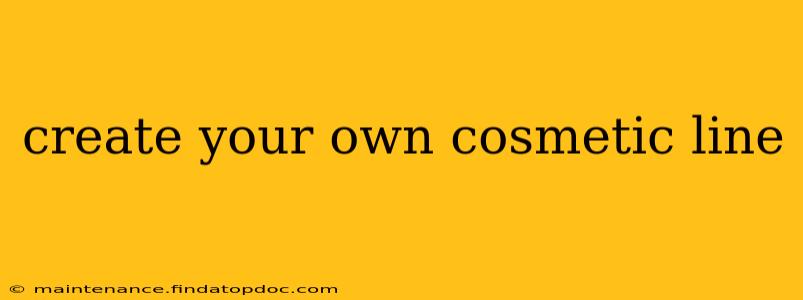Launching Your Own Cosmetic Line: A Comprehensive Guide
The allure of creating your own cosmetic line is undeniable. Whether driven by passion, a unique vision, or entrepreneurial ambition, building a successful brand requires meticulous planning and execution. This guide will delve into the key steps, challenges, and considerations involved in bringing your cosmetic dreams to life.
1. Defining Your Brand Identity and Target Audience:
Before diving into product development, you need a clear vision. What makes your brand unique? What specific needs or desires will your cosmetics address? Who is your ideal customer? Defining your brand identity—including your mission, values, and aesthetic—is crucial for consistent messaging and marketing. Understanding your target audience – their age, lifestyle, skin type, and preferences – informs every aspect of product creation and marketing.
2. Product Development: Formulation and Sourcing:
This is where the science and artistry meet. You'll need to decide on your initial product lineup. Will you focus on a niche (e.g., organic skincare, vegan makeup) or offer a broader range? Next, comes the crucial step of formulation. You can either:
- Develop your own formulations: This requires extensive knowledge of cosmetic chemistry and ingredient sourcing. Working with a cosmetic chemist is highly recommended, especially for complex products.
- Partner with a contract manufacturer (CM): CMs handle formulation, manufacturing, and packaging, relieving you of some logistical burdens. Choosing a reputable CM with experience and certifications is crucial for quality and safety.
- White labeling: This involves purchasing pre-made products and branding them with your own label. While easier to start with, it offers less control over formulation and quality.
3. Legal and Regulatory Compliance:
Navigating the legal landscape of cosmetics is critical. Research and comply with all relevant regulations in your target markets. This includes:
- Ingredient safety: Ensure all ingredients meet safety standards and are properly labeled. Consult with a regulatory expert to avoid potential issues.
- Packaging and labeling requirements: Labels must accurately reflect ingredients, usage instructions, and any warnings.
- Testing and certification: Depending on your products and target markets, you might need to conduct testing to ensure safety and efficacy.
4. Branding and Packaging:
Your brand's visual identity is as important as its products. This includes:
- Logo design: Create a memorable and aesthetically pleasing logo that reflects your brand's values.
- Packaging design: Choose packaging that is attractive, functional, and environmentally friendly. Consider sustainability and recyclability.
- Brand voice and messaging: Develop consistent messaging that resonates with your target audience.
5. Marketing and Sales Strategy:
How will you reach your customers? Consider a multi-channel approach:
- E-commerce website: A professional website is essential for direct-to-consumer sales.
- Social media marketing: Utilize platforms like Instagram and TikTok to showcase your products and engage with potential customers.
- Influencer marketing: Partnering with relevant influencers can significantly boost brand awareness.
- Wholesale partnerships: Explore opportunities to sell your products through retailers or boutiques.
6. Funding and Financial Planning:
Starting a cosmetic line requires upfront investment. Consider various funding options:
- Self-funding: Using your personal savings.
- Small business loans: Securing a loan from a bank or credit union.
- Crowdfunding: Raising funds through online platforms.
7. Manufacturing and Logistics:
Once you've finalized your product line, you'll need to manage production, inventory, and shipping. Efficient logistics are crucial for timely delivery and customer satisfaction.
Frequently Asked Questions (FAQs):
What are the startup costs for launching a cosmetic line? Startup costs vary widely depending on your product line, manufacturing choices (contract manufacturer, white label, etc.), marketing strategy, and initial inventory. Expect a significant investment.
How do I get my cosmetic products tested and certified? Testing requirements differ based on the product, ingredients, and target market. You'll need to research specific regulations and may need to work with independent labs to conduct safety and efficacy testing. Certifications like cruelty-free or organic will require adherence to specific standards.
How do I find a reliable contract manufacturer? Thoroughly research potential CMs. Look for experience in the cosmetics industry, certifications, and strong reviews. Request samples and discuss your requirements in detail.
What are the biggest challenges in launching a cosmetic line? Competition is fierce, regulatory compliance can be complex, and managing inventory and logistics can be challenging. Successful brands prioritize high-quality products, effective marketing, and exceptional customer service.
Launching your own cosmetic line is an ambitious undertaking. By careful planning, research, and execution, you can turn your passion into a thriving business. Remember to prioritize quality, safety, and ethical practices throughout the process.
